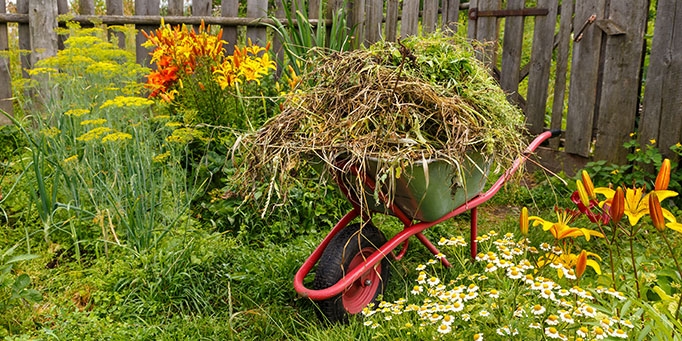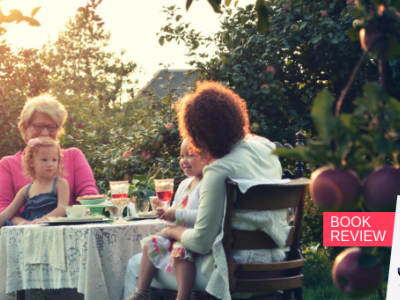
Living with joy in a garden of weeds
When life's not how we imagined.
I became a gardener four years ago when we bought our first home—set on a sloping block with steep terraces filled with plants. I was delighted with the camellias, gardenias and wisteria out the front, and the established trees and Australian natives behind the house, and the vision I had for the perfect garden I would create and tend. I imagined the beauty of the garden itself, and of the times my family and friends would spend there.
Not long after we moved in, as I pottered among the plants, I slipped in the wet garden and broke my ankle badly. I wore a moon-boot for months and, as you can imagine, I didn’t do much gardening. Coincidentally, my youngest son also broke his leg around the same time, so between our two injuries, we didn’t have the summer we were hoping for.
By the time I returned to my garden, every previously bare patch of earth on every terrace, was full of weeds. They strangled the small ground covers I’d planted, climbed over bushes and peeped up through the middle of shrubs.
Still, my vision for my garden remained, and I started to do battle—digging, pulling, teasing out the roots. I loved visiting nurseries, choosing little plants to grow in my much anticipated garden. I pressed on towards the beauty I could see in my mind’s eye.
Come autumn, the enormous liquidambar tree began dropping its leaves and my attention was diverted from weeding to raking. Each weekend we filled our green bins to overflowing. The lawn under the carpet of leaves began to die, and, as it was impossible to climb the slope each day to clear the leaves off the smaller plants, they died too.
By the time spring rolled around, many of my carefully chosen plants had been smothered by the fallen leaves, the lawn was patchy, and the weeds had returned. This time, pressing on felt harder.
I was no longer delighting in my garden or enjoying its beauty. Time spent there was a time of frustration and struggle. The garden was too big for me to manage. I shed tears of disappointment. How could I enjoy a garden full of weeds?
In time I rallied, and as I began again, I was learning—about gardening, yes, but also about myself and my God.
The vision for my garden is neatness, flourishing, and beauty. And my vision for family life is similar—peaceful relationships, thriving children, calm and healthy routines. But real life is messy and sin-sullied. If my goal is perfection, or anything close to it, then my life both as a gardener and as a parent will be fraught with frustration and sorrow. What’s more, I’m likely to take out my frustration on others around me, who have no greater capacity for perfection than I do.
There’s an internet meme that says: ‘Being a parent is saying “After this week, things will settle down” every week until you die’.
I laughed when I read that. I’d said almost those exact words earlier that day! But it also made me recognise in myself a putting-on-hold of joy because I was waiting—for my kids to be better behaved, for our finances to be in order, for me to be more disciplined, for the busy week to be over … for things to ‘settle down’. And if I’m honest, I know they never will.
As someone who has been saved by the lavish kindness of Jesus, I want to live a life of joy and gratitude now. The question plagues me: How can we live lives of joy in a garden of weeds?
It’s not our garden
In life, as in gardening, I often see in myself an anxious striving to ‘get things right’, a frenzied and exhausted pulling of weeds that denies the sovereignty and goodness of the God I serve.
I need to remember that God is in control of the whole garden. The growth and demise of trees is entirely in his hands—as is the success of our projects, our careers, our health and our parenting. It’s not really our garden, and though we tend it, helping plants to thrive and supressing weeds where we can, we are not ultimately in control of the way it grows.
Living with joy among the mess and imperfections of life means less of a focus on getting things right myself, and more focus on knowing the one who has done all things right for me. As we grow to know God better, we will take joy in who he is. Like the prophet Habakkuk, whose understanding of God’s power and goodness enabled him to pray:
‘Though the fig tree does not bud
and there are no grapes on the vines,
though the olive crop fails
and the fields produce no food,
though there are no sheep in the pen
and no cattle in the stalls,
yet I will rejoice in the LORD,
I will be joyful in God my Saviour.’ (Habbakkuk 3:17–18)
We don’t garden alone
Keeping our eyes fixed on Jesus is hard. As God’s children we are called to family life and warned not to give up meeting together, and this is why! Just as the Israelites were commanded to annually commemorate God’s goodness in delivering them from slavery, as God’s children we must often remind one another of God’s goodness to us in delivering us from slavery to sin—and joyfully celebrate the beauty and freedom of being his people.
The weeds of life are tools in God’s hands
If we think of joy as something like happiness, it will seem a fickle thing. But to live with real joy, we must learn to take joy in the things that our God takes joy in: the salvation and sanctification of his people.
As a daughter of God, I know that nothing about my life will give God more joy than the gradual (some might say painfully slow!) refining of my heart and mind to make me more like Jesus. And in remembering this, the weeds make more sense! Those pesky annoyances, those mistakes and failures, those habits that seem to grow back as soon as we rip them out—those weeds are growing us—perhaps in patience as we wait for the season to change, in self-control as we learn to tolerate a particular irritation, or in faithfulness as we continue to dig out unhelpful habits.
Knowing that God loves us enough to teach us is a cause for celebration. Even as they wept, the prophet Nehemiah encouraged the Israelites to eat, drink and celebrate after hearing from God’s law saying, ‘the joy of the LORD is your strength!’. In the same way, we can take joy in our Father’s attentive, transforming love.
Look forward to our heavenly garden
As we spend our days tending to the garden of our life, it’s easy to forget that this is not our real home. We don’t need a weed-free garden here on earth, because we are promised one in heaven. Let’s set our eyes on the sure hope of our future with our loving King, where there will be no more tears or sorrow or pain—and no more weeds.
I’m learning to live with joy in a garden of weeds. There’s a lot of beauty here. Among the frustrations and disappointments, lovely things are growing, and even where they aren’t, I—together with my brothers and sisters—can take joy in the unwavering love of the Great Gardener who is the source of all growth.
---
Kat Israel is mum to five school-aged kids and a preschool educator. She is married to Toby and they live in suburban Sydney.

Reap Journal (Adult edition)
If you’re training to be an athlete or concert pianist, you’ll no doubt have a daily workout or regime to get you to your goal. So, how do you train to be godly? By devoting yourself to the word of God and being disciplined in allocating time to its study and meditation!
For more articles from Growing Faith, subscribe to our monthly e-newsletter.
To hear about the latest books and resources from Youthworks Media, subscribe here.








